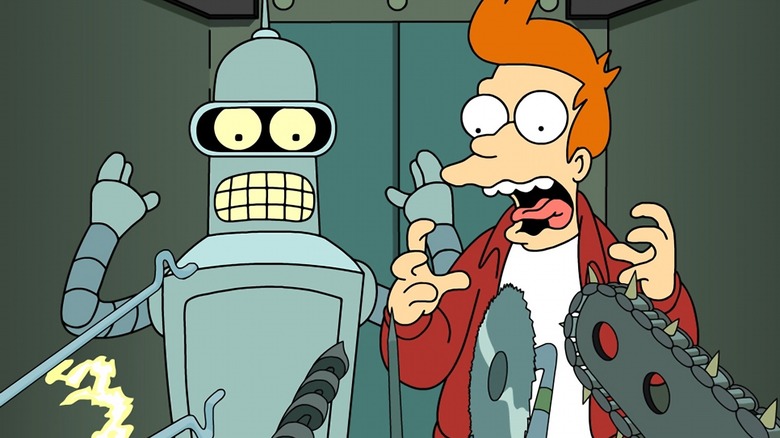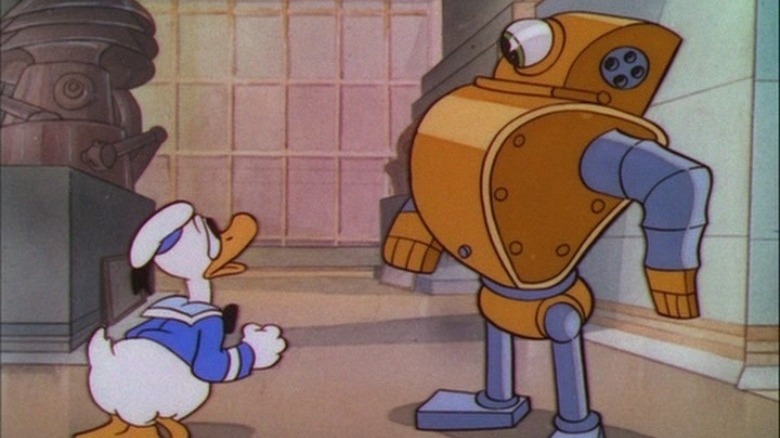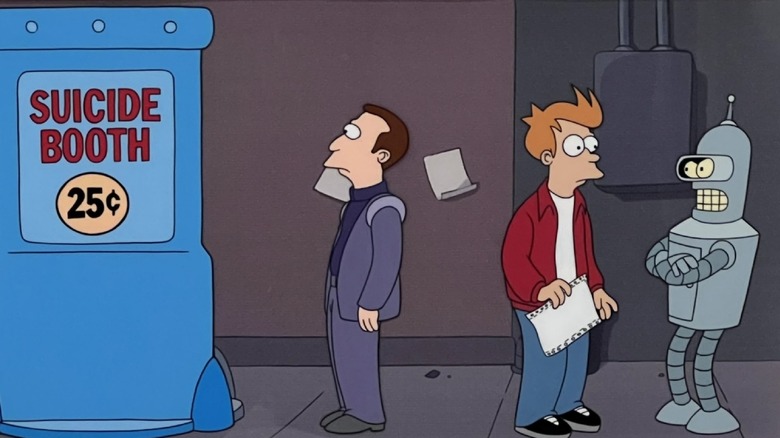One Of Futurama's Darkest Running Jokes Was Inspired By Donald Duck
When "Futurama" first aired in 1999, creators Matt Groening and David X. Cohen wanted it to be just the right balance of bright and cynical. The series followed a hapless dope named Fry (Billy West) who is accidentally cryogenically frozen in 1999 and who wakes up in the year 2999. Because he was already living such a humdrum, dead-end life as a pizza delivery boy, Fry saw the freezing as an improvement. When he first wakes up in the future, Fry ponders that everyone he has ever known has died. He thinks about that for a moment before exclaiming "Woo hoo!" There was an undercurrent of philosophical bitterness in the early days of "Futurama" that reflected the "end of the millennium" angst so pervasive in the 20th century's final decade.
There were all manner of fantastical technologies on "Futurama," but they always came with a sardonic element. The robot Bender (John DiMaggio) hated humans and was a kleptomaniac alcoholic. Why would humans build such a thing? Notably, and this was a detail that made the studio initially balk, was the fact that there were coin-operated suicide booths on every corner. The future is technologically bright, but suicidal despair has become so common as to be commodified.
On the DVD commentary track for the first episode "Futurama," Groening and Cohen recalled that they "didn't want the future to be dark and drippy like 'Blade Runner,' but we didn't want it to be bland and boring like 'The Jetsons.'" Imagine their pain when the Fox execs noted that they loved "The Jetsons." And, yes, they never got used to the suicide booth jokes.
As it so happens, the idea for a suicide booth was inspired by the 1937 Donald Duck short "Modern Inventions."
Modern Inventions
On the commentary track, Groening said that "[t]he coin-op suicide booth was inspired by a Donald Duck cartoon in which Donald Duck went to a museum of the future and he did all these coin-op devices that injured him."
The cartoon in question, "Modern Inventions," was the directorial debut of Jack King, one of the medium's greatest luminaries of the 1930s. King began his career as an animator for Disney and then moved to Warner Bros. to work on the studio's early Buddy cartoons. Buddy, one of the lesser-known Looney Tunes characters, was a young human boy who had pleasant misadventures. He was the studio's second "big star" after Bosko. In 1937, King returned to direct numerous Donald Duck cartoons. He stayed with the company until 1949. His final job was directing the "Wind in the Willows" portion of "The Adventures of Ichabod and Mr. Toad."
"Modern Inventions," as Groening describes it, follows Donald into a futuristic museum stocked with elaborate and bizarre automated contraptions, as well as nightmarish helper robots. Donald runs afoul (afowl?) of an automatic bundle wrapper that mummifies him in cellophane and a robotic nursemaid that force-feeds him. Most akin to "Futurama" was a coin-operated robotic barber's chair. Because of some bodily contortions, the chair styles Donald's butt while rubbing shoe polish on his face. The cartoon ends with Donald throwing a wrathful fit.
In the "Futurama" suicide booths, a user enters and plunks a coin in a slot. The door closes and weapons unfold from the wall. One can choose between a "quick and painless" death or a "slow and horrible" one that uses chainsaws, electroshock, and, uh, melon ballers. The booth's automated voice is just as polite as the one Donald heard from the automated barber's chair in "Modern Inventions."
The booths
But, just as Fox initially balked at the idea of including suicide booths as a regular feature on a network TV show, so too did the writers eventually lose their taste for their own bleak gag. The booth did still occasionally crop up, but usually just as a background feature. The first episode of "Futurama" also introduced career chips which were implanted in people's palms. That details was also quickly abandoned. Weirdly, in an interview with Lightspeed Magazine, Cohen admitted that, despite some initial trepidation from the higher-ups, there were no complaints or calls about the show's industry of coin-op euthanasia.
Cohen reasoned that a lot of his show's violent gags, its pointedly tasteless jokes about alcoholism, and jests about vend-a-death machines were all softened by the fact that they were all at the expense of a robot. It seems that network censors get huffy when a human character smokes, drinks, and fires two guns at the same time, but are fine with the same actions in the hands of a robot. Cohen said as much again in another commentary track for the episode where Bender took a TV show hostage and encouraged viewers to beat their children. If that had been Fry, no one would have stood for it.
Matt Groening, meanwhile, is incredibly well-versed in old cartoons and genre movies, so if you're fond of his work, it may behoove you to watch Donald Duck cartoons from the 1930s. You can see "Modern Inventions" easily enough. It may just unlock something.


